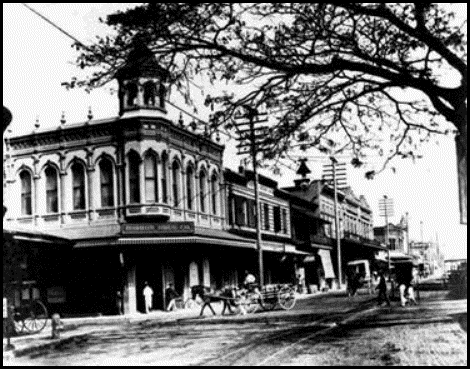20th Century
Stories
Barbara Hamby
(University of Iowa)

Lester served in Italy, France and Germany. He was wounded and the army sent him back home to recuperate. He met Katharine in the hospital --- she was a nurse from Ohio --- and they married and had two kids and we get to follow them through twelve stories until he sickens and dies (at the beginning: everything is told backwards ... as it should be).
And there you have the bare bones of it and as I am sketching out this stuff I am thinking that it is --- as Tom Robbins used to say --- all in the wrist. For Hamby is a hell of a story-teller, got to me on page one, right at the beginning (there at the end), and scarcely let me go until we got to the end ... which was the beginning.
In keeping with her art and craft, which is considerable, she tells her story in reverse, starting with the death of dear Lester, his growing up in Hawai'i. She takes him back to the moment when he first meets Katharine: she the nurse, he the patient, him telling her about being wounded in Germany, the jeep in front of him blown up, "Two men just disappeared."
- "So you were lucky again."
"I was lucky again," Lester said, not feeling lucky, because it happened right after they got to Dachau. He couldn't tell her about all those starving people in their filthy rags.
Dear reader: I think you are lucky because you haven't read Lester Higata's 20th Century yet and now you can do something that I can't do again, that is, open the book up, start it fresh and clean, be as captivated by it as I was ... get so fond of Lester that you maybe want to go off to Hawai'i as I did to see if you can't find someone just like him who lives his life as a good man lives his life, in a story wonderfully told, taking on with him the wretchedness represented by those haoles moving onto his beloved island "with their boatloads of blue eyes and syphilis," paving over Honolulu so they can drive their cars where there were once hills of flowers, that sweet smelling plumeria, which comes in when "the trade winds were blowing, the scent of its creamy blossoms filled the room."
Lester joined the army in 1942. He and his friends "were Americans, but they looked like the enemy. So the Army sent them to Italy."
- The blue of the Mediterranean was paler than the blue of the Pacific, as if the Romans and Greeks had diluted the color with the white of their bones.
We trail through the lives of Lester and Katherine and their inlaws and children until Lester meets with his father, who "looked pretty good for someone who'd been dead almost sixty years." This was Lester's clue, and ours, too, that his time was drawing nigh, "his life was about to end when he walked out on the lanai behind his house in Makiki and saw his long-dead father sitting in a lawn chair near his little greenhouse where Lester kept his orchids."
In the time I have been working on Lester Higata's 20th Century, I have not only fallen in love with Lester and Katherine and even his pruny old mother who never liked Katherine or anyone for that matter partly because of this reason: for the first time in my life I have been given the chance to live in the mix culture and life and beauty of Hawai'i and especially the language, a language with a hundred words for rain: "The rain was coming now in a fine mist. What was the word for this rain? What was the word for the sky of scudding clouds with stars glittering behind? What was the word for the rumbling that was coming across the ocean from Asia, a dark drumming that no one could hear but soon would tear holes in the sky and the earth?"
There at the beginning, Lester is leaving us, leaving his family, leaving as he follows his father through the door, "into the rain, the house disappeared along with the roads and all the buildings."
- He was moving through the jungle that had covered O'ahu before it had that name, when wild boar roamed the underbrush, and red and yellow plumed birds glided in the treetops ... He felt the music of the universe vibrating in him, the rain washing over him, washing the years away ... It was all gone, and he moved through the green land with its fishing pools, kheiau, and taro fields, the world opening up, timeless and relaxed as a saxophone solo by a broken man, whose voice was too sweet for this world.